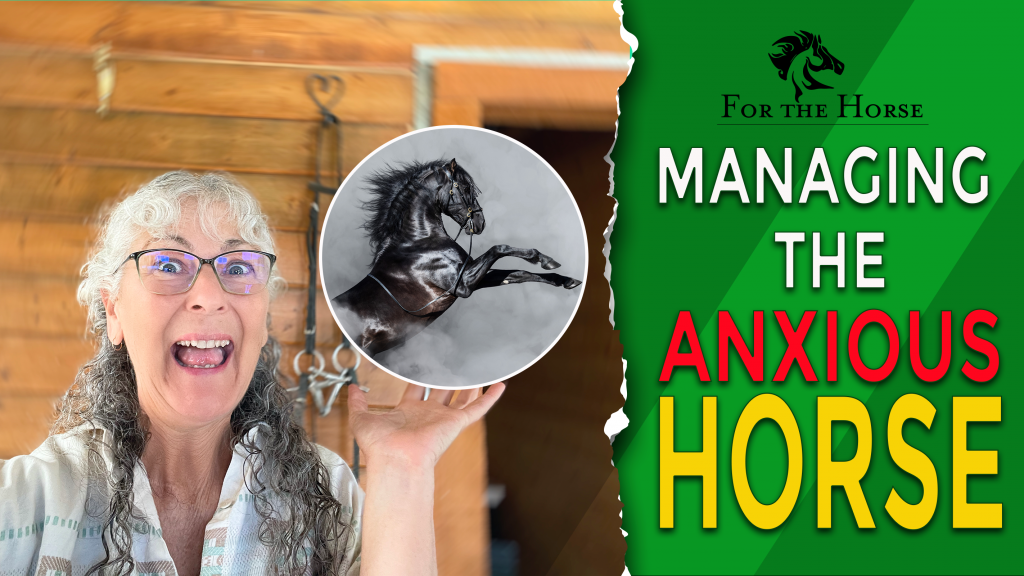How do I help my horse who's scared or anxious?
Do you ask yourself this question? I know I certainly did.
In order to get the answer, here's what we need to know...
The first thing we need to know are the hidden problems that we're dealing with for an anxious horse. Next, how much is too much information? And how that can actually harm the situation? Next, how to manage an anxious horse? And finally, how does a rider gets in his or her own way?
Let's dive in ...
#1. Hidden Problems Of Dealing With An Anxious Horse
Labelling
We are labeling our horse as anxious this actually can be the start of not solving the problem. Because it's perpetuating the label of being anxious.
Our horses may be acting in an anxious way or have a behavior that's anxious, but they are not anxious. That's not who they are. They're not an anxious horse. Understanding who our horses are very important, and then accept who they are.
Just a sensitive horse
Your horse might be anxious, because maybe your horse is a very sensitive mare.
Once you recognize that and once you understand that, then you can address it and say,
"I have a very sensitive mare. How do I handle that? How do I deal with a very sensitive mare who happens to get anxious in this kind of a situation?"
Once we understand who our horse is, and we know where they're coming from, then we know how to deal with it.
Pain
Another thing that could be happening is your horses in pain. And this is a pretty serious situation, because a lot of the times horses can be very stoic, and we don't know that they're in pain.
Maybe it's a previous injury, but what happens is, these things stack up one on top of the other.
In our Harmony For the Horse Program we help you to find the hidden problems that are causing anxiety and to work with your horse as a guide to get clear on what your horse needs from you.
CLICK HERE to discover more about how we can help you to reach freedom, achievement, oneness and joy that you most seek with your horse.
Gaps from a previous training issue, lack of understanding, emotional misunderstanding
Imagine this... on top of all of these things, you go out and you want to do a trail ride, or you want to do a hack. A bunch of geese fly up in the pond. Your horse has already gone into that situation not having much capacity emotionally, because they're dealing with some pain that's niggling and taking up space.
And maybe there's a problem with worrying about the bit at the same time. And so that's another emotional thing that's happening, that's taking up emotional capacity for them. And then you're they're out on their own, and then something triggers the whole thing to explode.
So the capacity for them to handle more emotional input, is what the true problem is. And that's where we really need to focus our attention once you know who your horse is, and once you accept who your horse is, now we turn to the issue of how do I find out the capacity?
Where is my horse's emotional capacity?
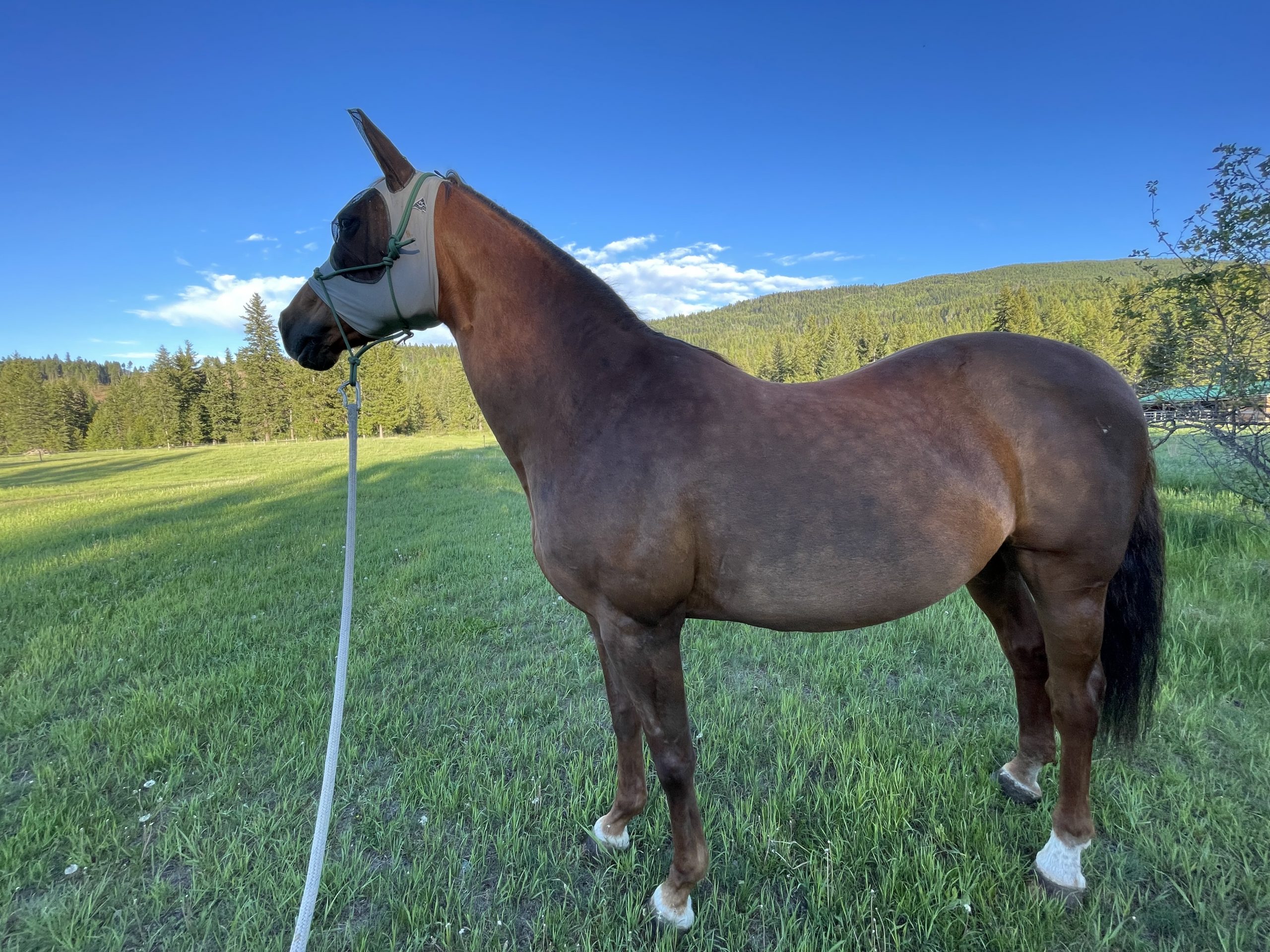
Here's an example...
I was just talking to somebody the other day, and she had rescued a horse. She was telling me that the horse just didn't want to go to the right. So, the horse didn't want to go right no matter what. And she had thought that this horse would be wonderful for her daughter, but she was having second thoughts because the horse acted up when she tried to turn right.
So, she looked for advice. She went to different trainers, they said, “Oh, we'll bring your horse here for 30 days”. Or she talked to somebody, and they'd say, “well, you're horse is just trying to get away with something!”They're also trying to pull something over you, you just have to be, just tell the horse to get on with it."
And yet this woman knew her intuition was telling her that there was something wrong. She didn't know what it was, and she didn't know how to solve the problem. But she knew that there was something wrong.
Why couldn't her horse go to the right where it could go to the left, for example. And you know what it came down to, she actually questioned that her horse was blind. And when she looked for help, she would say, “I think my horse is blind. What do you think? ” And they're like, “No, no, no, no, that's absolutely not”, “your horse is just trying to, you know, get away with something.”
As she worked with her horse things were getting worse. And this was upsetting her. She was doing what she was told to do. But she noticed it was getting worse. And here, she had good intentions of rescuing this horse to hopefully be her daughter's horse.
And now it was proving to be unsafe, because every time she tried to go right, there was this emotional upheaval, that comes down to what we just talked about, which is that the horse was probably in pain, or there was a training issue previously that she didn't know about.
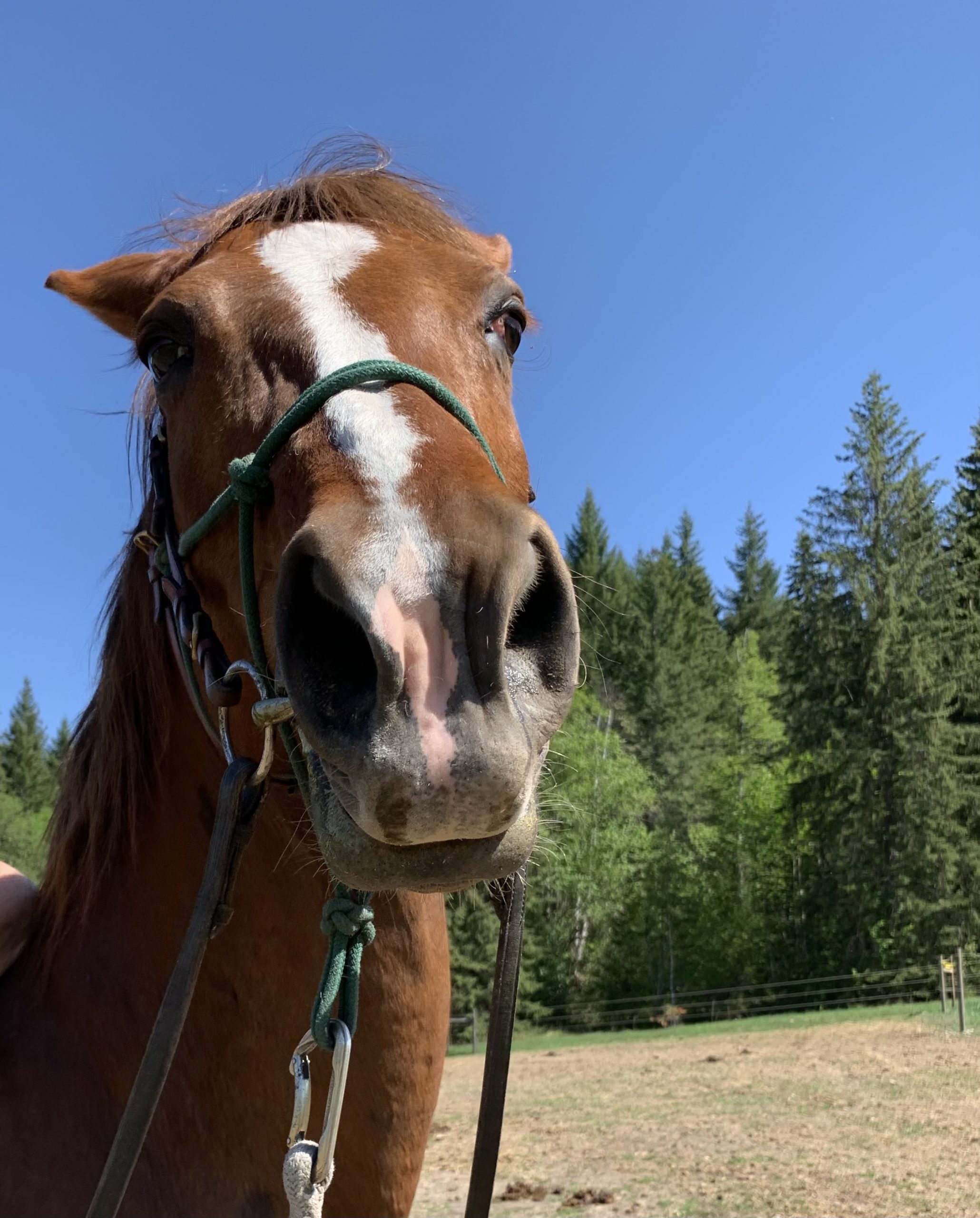


So the emotional capacity was being filled up. And the horse had to deal with those things, perhaps the pain of the rider being on the back, going right in a direction where the horse was stiff, or her ever wasn't able or didn't know how to do what she was asking.
And then the emotion started to build and build until the horse became scary. She felt so stuck in that situation.
And that's why she reached out to me, and said to me, “you know, this horse is a really sweet horse”.
Which I could imagine, as she talked to me on the phone, I could totally imagine what she was going through and what she was saying, I've seen it so many times before.
It comes down to that this was just a misunderstanding, emotions get involved.
She was upset, the horse gets upset. And it's an emotional understanding. And this emotional misunderstanding is the situation that's not understood by her or her horse.
And the second thing is that it's not integrated. So then, if it's not understood, and it's not integrated, it just gets left there. And does that help this rider to be more there or ready to help the horse when the horse needs it?
No, no, it doesn't. It doesn't help the rider. When the rider is dealing with their own emotions and scared, they can't possibly be there for the horse when the horse needs them. So this rider needed support, she needs help.
As a rider, she needs help with that horse to get where she wanted to go. And she needs to know what to look for. And that's my next point that I'm going to get into here, which is too much information.
#2. Too Much Information
You can collect a ton of information, but unless you know what you're looking for you will still not be any further ahead with understanding the anxiety.
I talk to so many riders, and it's amazing how they just don't know what to look for.
So they don't understand what the horse is saying. And therefore, if you don't know what to look for, then how can you possibly give a solution? And then if this happens, for days, weeks, months, the rider's confidence gets eroded.
It doesn't need to be that way.
Another rider told me, “I attended clinics for 10 years, three clinics a year, for 10 years, and spent, I don't know about $5,000 a clinic”.
And she still didn't know what she was looking for, it was just putting her through her paces.
So, you need to know what you're looking for.
Horse is being a horse looking for survival, security, safety
Horses are just being horses.
If a horse is out on their own, and they see another horse in the distance, they may be anxious.
As a herd animal they want comfort, and they want security, and they need to survive. And they know that the group gives them that comfort in the security to survive so they will want to be with the other horse unless you have unless you have the relationship and the trust in a very good, strong place.
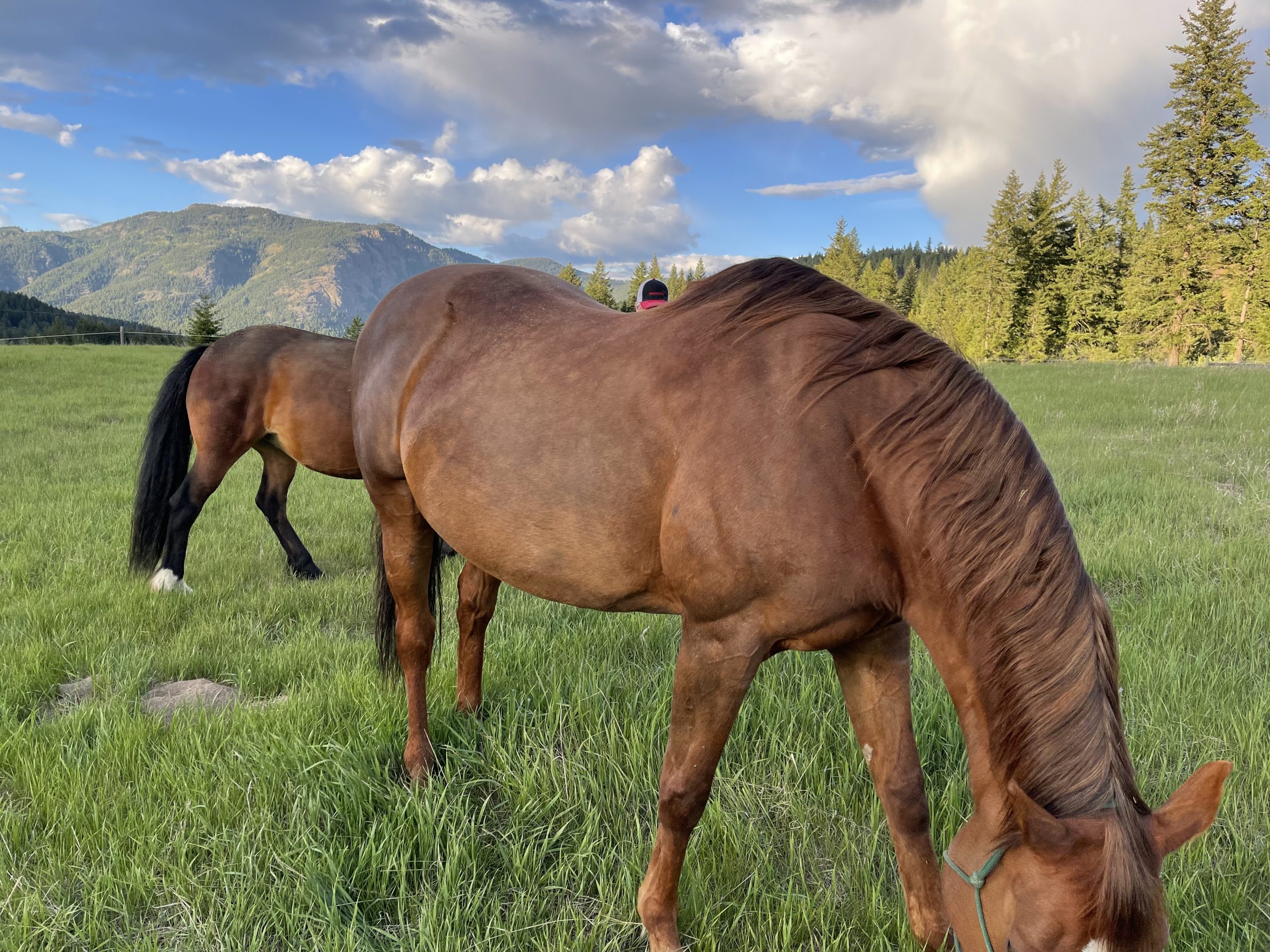


So understanding that your horse just wants to be with other horses and that's just being a horse. You can't change that. But what you can do is you can help your relationship to be stronger.
Rider is being a human with belief systems, emotions, objections
And us as humans, we're just being people. We have belief systems, we have emotions, and we have objections, don't we?
So, if as riders we are caught in that place where we get emotional, because our horses getting upset and anxious, that will stop us from actually being able to see what's going on.
And this is what we do in our program. If you get a chance to work with us, this is what we do, we help you to see what you cannot see where you are emotionally involved and attached too much so that you can't see where the problem lies and get the solution.
We help you to find yourself emotionally, how to process your emotions, and how to have a plan and a system. Our job is to do that. Even if you're a recreational rider, our job is to be as good as we can be. And that involves processing our emotions, and having the tools to do that.
CLICK HERE to discover more about how we can help you to reach freedom, achievement, oneness and joy that you most seek with your horse.
3. Trust And Relationship
Build trust and relationship...
And I know you might be saying, “oh, I've done that for so many years, I've been working on trust and my relationship, I do this, I do that”.
But if you're still not making the mark, if you're still not there, there's something not working.
Work on this every day
We do need to work on this every day. If your horse is going to the place where they want to be with another horse, they've lost their the connection to you.They've probably lost curiosity. They're not being connected with you at all. And they've lost the trust in you at that moment and their environment.
So how do you get these things back? That's the question.
- use another horse to help.
- go for walks, take another horse
- progressively approach and retreat to the scary situation. If you want to go out on the trail, consider your trail as being maybe 30 seconds away. Have a different outlook on it. Maybe you just you go through all the work, you saddle up and everything, you go 30 seconds and you come back.
- You have to accept that as a gift, accept that as a win.
- Then the next day, maybe you go 45 seconds down the road and then you come back.
- Use special treats. Secret jackpots. You're walking and your horse is distracted, and you actually point your horse to the jackpot.
- Keep the conversation going.
- Accept who your horse is.
- Lateral movements.
So you're constantly working on this all the time. Accepting who your horse is, is huge that we just mentioned as well. It's hard to accept that maybe you have a super sensitive horse. But once you do that, then you can get beyond it and go to the next level and this is what we help you to do within in our program as well.
Refer back to that other training I did about what motivates your horse ... you can key into those things. secret jackpots located somewhere along the trail.
So you're continually working on the conversation...where your horse is checking in with you. And you're checking in with your horse and you're saying, “What about this?” “Hey, how about if we go this way?” “Oh, do you want to eat some grass here or look?” “Oh, wow, there's a bucket full of treats over here”.
Always keeping the conversation and the attention on you, when you see the attention leave, maybe do some lateral work, that's great fun.
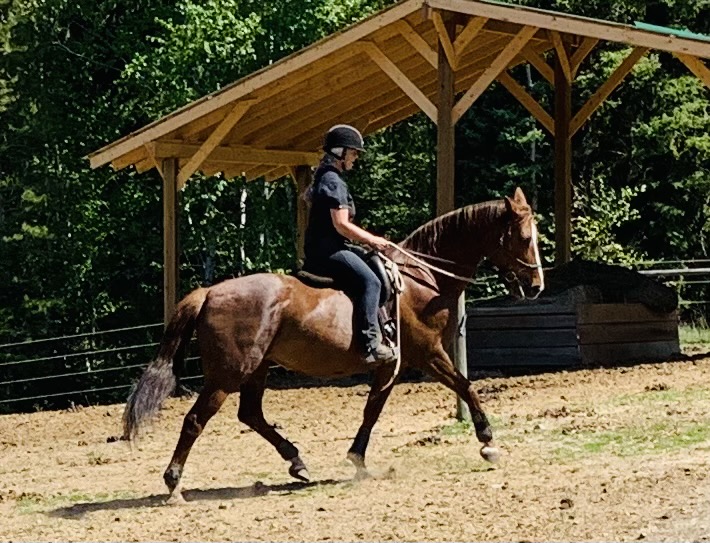


And this leads me to also to describe to you what we do in our program to you...
For example, the Liberty work we do in our program is different from Liberty work you've seen before, the nuances and the body movement, and the atunement that we help you to find in yourself transfers directly to everything that you do with your horse so that you become closer and closer, you understand when things are starting to just ever so slightly go off, and you can take action on that.
And that builds your confidence. Because there's nothing more that erodes your confidence than dealing with this all the time, not having the support, and then being afraid.
TOP TIPS:
- create the relationship between you and your horse, such that she still has curiosity, you're still inspiring her...where your horse says, “I like being with you”, “I feel good when I'm with you”. “I understand when I'm with you”.
- no pain
- no training gaps
#4. How are you getting in your own way?
So let me know if this is you...
*You have an incredible deep yearning to be with your horse.
*You want to help your horse.
*You want to help your horse in situations.
*You want to enjoy each other.
*You want to do stuff together.
*You want to get results.
Is that you?
But what happens along the way, is that it gets torn apart. And it gets torn apart by this misunderstanding that I was telling you about. It gets torn apart, apart because horses are horses and humans, or horse are humans. And each of us has characteristics that we need to look at and process. If we don't, it will be an ever-ending downhill spiral. And you'll just do the same thing you've always done, and you'll get the same results you've always done. And that's how we get in our own way.
We don't understand that there is a misunderstanding happening. And that's all it is. It's just as simple as that. It's just as simple as how much emotional capacity does my horse have right now to go down the road and visit the neighbor, for example. Or where is my horse holding tension in their body, perhaps from an injury year and years ago? And there's a compensation pattern, and my horse just can't do what I'm asking. And that pushes them over their emotional limit.
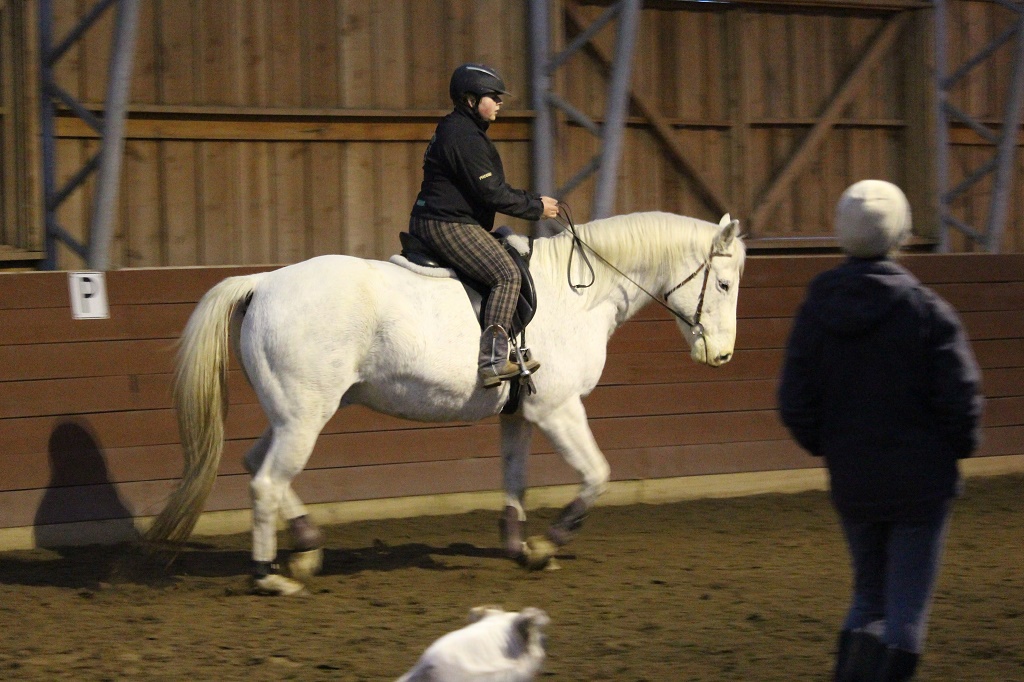


How are there gaps within my horse training? Where are they? How can I resolve them? How is my horse trying desperately to fit into the human horse world understand us humans? And I don't understand what's going on.
So, if we're not addressing these things in ourselves and in our horses, then the emotions get worked up. And that's when the problems arise. The yelling might start, maybe whacking with the whip, the accusations, calling your horse names.
This is when the fear builds up. And it all escalates, when it's just a misunderstanding is just an emotional event that's not being processed and understood. So, if you're missing the mark on this one, right, if you've been doing this for so many years, and you're still where you are even weeks, even months, time is ticking by, we don't need to be stuck in this place.
We can get over this, it doesn't have to be this way.
So, if you're looking for help to find the specific needs that your horse has, or the specific needs that you have, as a rider, both mentally, emotionally and physically, all of these things and your horse and you're spending way too much time and it's like this has got to end this is it's time for a change.
We help people to deal with their anxious horses, help them to get over fear, help them to get results. Help them to feel that deep yearning to be with their horse to love their horse, to be with the horse to have fun to do stuff to go out on the ride and not have all the stress and fear that's involved.
CLICK HERE to schedule a call with us!
MORE RESOURCES TO HELP YOU BUILD YOUR DREAM HORSE

